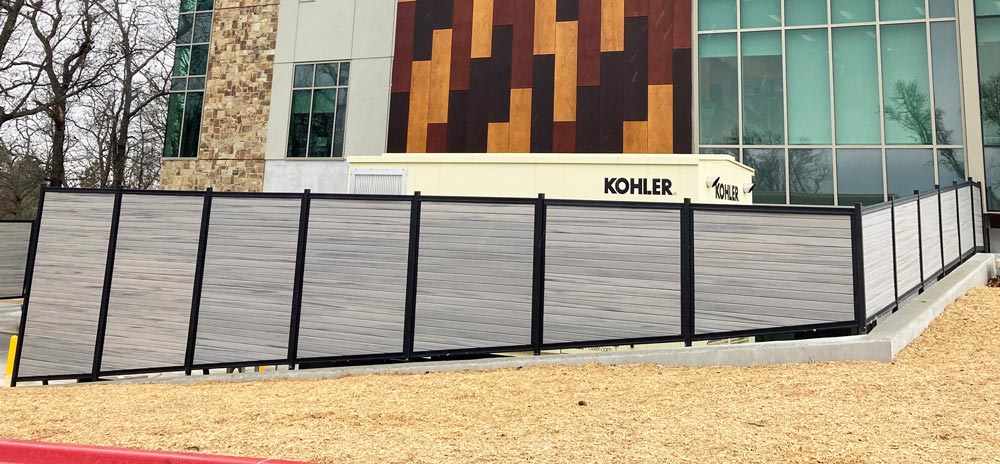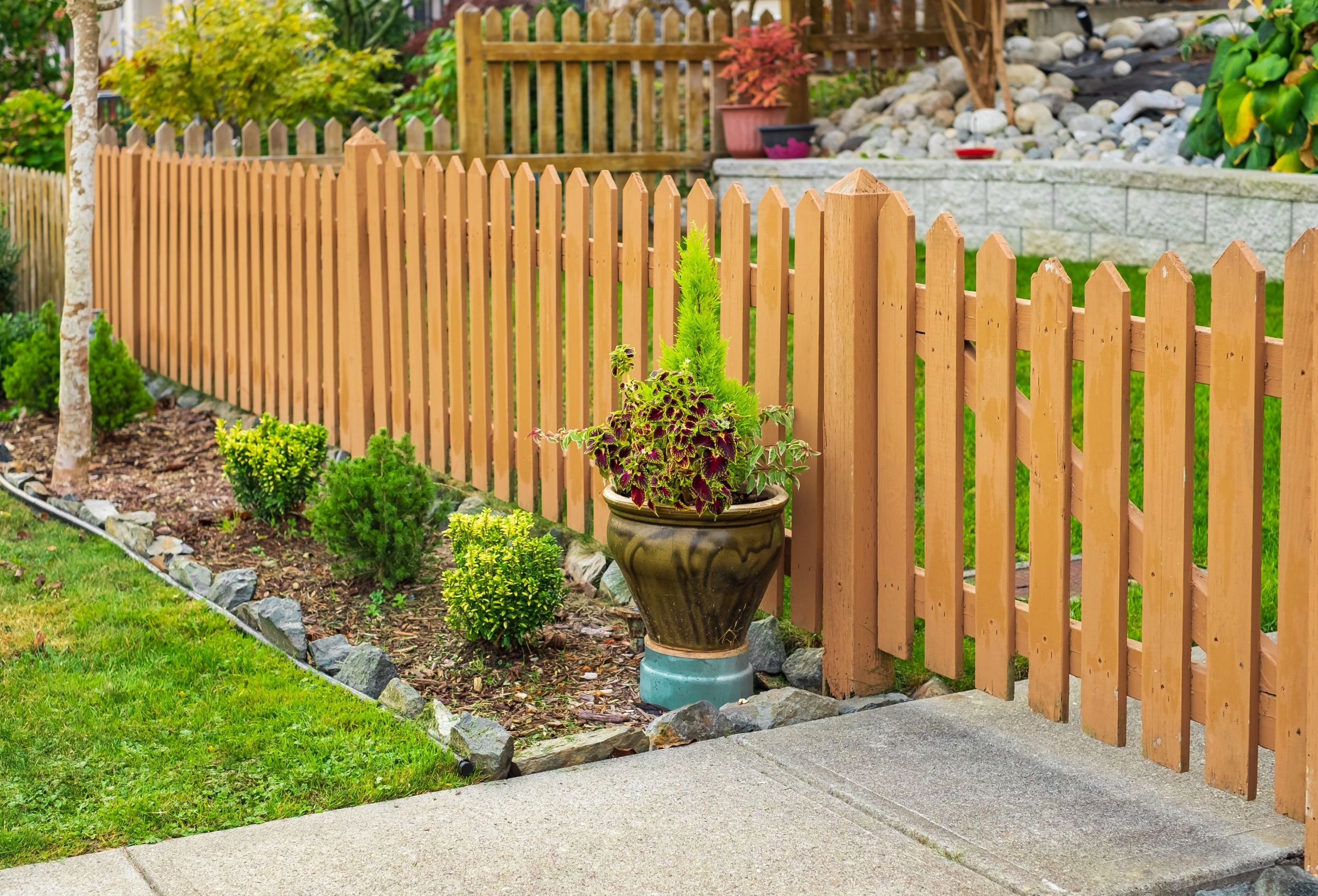All Categories
Featured
Creating and installing a fencing around your residential property needs mindful planning and partnership with an experienced fence specialist. Right here's a detailed guide on exactly how to work effectively with a fencing professional to develop a fence that fulfills your requirements.
Fence can serve several functions, so understanding what's essential to you is essential in directing your specialist's recommendations. A privacy fencing made from wood or vinyl may be optimal for blocking sightlines, while a wrought iron fence might be far better suited for attractive objectives with included protection.
Wood: A flexible and standard choice, wood provides natural charm and can be personalized in many designs. Nonetheless, timber fencings require more upkeep, as they need normal discoloration or painting to maintain their appearance.
![]()
Vinyl: Understood for its reduced upkeep and lengthy lifespan, vinyl fences are resistant to fading, decaying, and weathering. This makes them an exceptional alternative for those looking for a problem-free remedy.
Chain Web Link: A economical and low-maintenance alternative, wire mesh fence are usually utilized for protection purposes or when clear exposure is needed.
Metal (Aluminum/Wrought Iron): Steel fences provide a mix of beauty and toughness, and they are perfect for homes that need added safety or an extra polished appearance.
As soon as you've determined your needs, discuss the material alternatives with your specialist. They can recommend the very best material based upon your spending plan, wanted appearances, and maintenance preferences.
![]()
Your professional can assist you pick the proper style, whether that's a high personal privacy fence, an ornamental fencing, or something in between. Some style factors to consider include:
Elevation: Relying on your privacy and safety and security needs, you'll wish to choose a proper fence elevation. Neighborhood zoning laws may have height constraints, so make sure to validate these with your professional.
Forming and Information: Custom-made includes such as lattice panels, decorative articles, or specific styles can add character to your fencing and make it stand apart.
Gates: If you need entrances for a driveway, pedestrian accessibility, or a side backyard, make certain the professional recognizes the kind and place of gates you desire. Gates must mix with the fence's style and offer your capability requires.
Bear in mind that top quality materials and expert installation can supply long-term worth. Sometimes, spending a little bit a lot more upfront can conserve you cash on repairs and upkeep in the future.
Home lines: Make sure that your fencing is mounted within your residential property borders. The contractor can help in confirming the specific area of residential or commercial property lines.
Allows: Depending upon the location and elevation of your fence, you may require a permit to continue. Your professional can help you understand the required paperwork and authorization requirements.
Neighborhood guidelines: Some areas have homeowners' association (HOA) guidelines or covenants that dictate fencing shade, height, or material. Your contractor can help you navigate these limitations.
A good contractor will keep you updated on the task's progression and resolve any type of issues quickly. This joint strategy guarantees that your fencing will meet your expectations and stand the test of time.
Final thought. Collaborating with a fence professional to layout and mount a fencing requires thoughtful factor to consider and open communication. By defining your requirements, picking the right products, and maintaining the lines of interaction open, you can produce a fence that not just boosts your building's aesthetic appeals yet also satisfies your useful objectives. Whether you're seeking privacy, safety, or an attractive border for your yard, your contractor's know-how will be important in helping you attain the suitable fence layout.
- Specify Your Purpose for the Fencing. Prior to consulting with a contractor, take some time to define your function for the fencing. Understanding your goals will aid you connect your demands plainly to the professional.
Fence can serve several functions, so understanding what's essential to you is essential in directing your specialist's recommendations. A privacy fencing made from wood or vinyl may be optimal for blocking sightlines, while a wrought iron fence might be far better suited for attractive objectives with included protection.
- Select the Right Products. Picking the right materials is among the most important actions in the fencing style process. Various materials offer differing degrees of longevity, maintenance requirements, and aesthetic allure. Common fence materials consist of:
Wood: A flexible and standard choice, wood provides natural charm and can be personalized in many designs. Nonetheless, timber fencings require more upkeep, as they need normal discoloration or painting to maintain their appearance.

Vinyl: Understood for its reduced upkeep and lengthy lifespan, vinyl fences are resistant to fading, decaying, and weathering. This makes them an exceptional alternative for those looking for a problem-free remedy.
Chain Web Link: A economical and low-maintenance alternative, wire mesh fence are usually utilized for protection purposes or when clear exposure is needed.
Metal (Aluminum/Wrought Iron): Steel fences provide a mix of beauty and toughness, and they are perfect for homes that need added safety or an extra polished appearance.
As soon as you've determined your needs, discuss the material alternatives with your specialist. They can recommend the very best material based upon your spending plan, wanted appearances, and maintenance preferences.
- Think about the Design and Design. Style issues simply as much as function when it comes to designing your fencing. The design must complement the overall look of your building and home. Whether you're choosing a typical picket fence or a smooth modern-day steel style, the design will influence the visual appeals and feel of your space.

Your professional can assist you pick the proper style, whether that's a high personal privacy fence, an ornamental fencing, or something in between. Some style factors to consider include:
Elevation: Relying on your privacy and safety and security needs, you'll wish to choose a proper fence elevation. Neighborhood zoning laws may have height constraints, so make sure to validate these with your professional.
Forming and Information: Custom-made includes such as lattice panels, decorative articles, or specific styles can add character to your fencing and make it stand apart.
Gates: If you need entrances for a driveway, pedestrian accessibility, or a side backyard, make certain the professional recognizes the kind and place of gates you desire. Gates must mix with the fence's style and offer your capability requires.
- Develop a Budget plan. A clear budget is necessary for ensuring that your fence setup stays on track. Review your budget upfront with the service provider so they can advise services that align with your monetary assumptions. While you might desire a premium material or detailed layout, make certain to balance your needs with functional monetary considerations.
Bear in mind that top quality materials and expert installation can supply long-term worth. Sometimes, spending a little bit a lot more upfront can conserve you cash on repairs and upkeep in the future.
- Inspect Legal Needs. Prior to installation starts, ensure your fencing satisfies all neighborhood guidelines. Your specialist will likely have experience browsing zoning laws and getting permits. Some vital aspects to take into consideration consist of:
Home lines: Make sure that your fencing is mounted within your residential property borders. The contractor can help in confirming the specific area of residential or commercial property lines.
Allows: Depending upon the location and elevation of your fence, you may require a permit to continue. Your professional can help you understand the required paperwork and authorization requirements.
Neighborhood guidelines: Some areas have homeowners' association (HOA) guidelines or covenants that dictate fencing shade, height, or material. Your contractor can help you navigate these limitations.
- Communication and Follow-Through. Throughout the entire process, preserve open interaction with your contractor. This includes reviewing the design, attending to any kind of worries, and ensuring that the task remains within budget plan and timeline. If changes are required during setup, make sure you're spoken with ahead of time.
A good contractor will keep you updated on the task's progression and resolve any type of issues quickly. This joint strategy guarantees that your fencing will meet your expectations and stand the test of time.
Final thought. Collaborating with a fence professional to layout and mount a fencing requires thoughtful factor to consider and open communication. By defining your requirements, picking the right products, and maintaining the lines of interaction open, you can produce a fence that not just boosts your building's aesthetic appeals yet also satisfies your useful objectives. Whether you're seeking privacy, safety, or an attractive border for your yard, your contractor's know-how will be important in helping you attain the suitable fence layout.
Latest Posts
Unlock WyHy FCU – Trusted Financial Solutions for Your Money Goals
Published May 04, 25
1 min read
Pleasant Treats & Smooth Feelings at Shake Alley
Published May 03, 25
2 min read
Discover Cataract Surgery Near Me at the Eye Center South
Published May 03, 25
1 min read